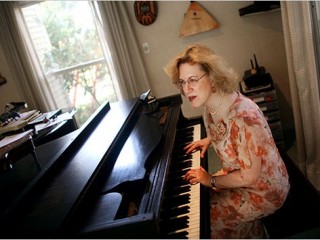
Sara Davis Buechner biography
Date of birth : -
Date of death : -
Birthplace : Baltimore, Maryland, U.S.
Nationality : American
Category : Arts and Entertainment
Last modified : 2011-11-01
Credited as : Pianist, ,
0 votes so far
The piano, even in the hands of a master, often seems elusive and treacherous, and the listener sometimes experiences a player's virtuosity as fragile and insecure, despite all the obviously right notes. Buechner's playing has none of that fragility; the listener can relax and enjoy the music, for he or she senses that Buechner's performance rests on the solid ground of an iron-clad technique. However, it is important to note that, having intuitively experienced Buechner's extraordinary technical prowess, the listener immediately perceives the larger context of this artist's extraordinary pianism. First of all, her playing is informed by a profound knowledge and understanding, both musical and cultural, of her vast repertoire, which ranges from J. S. Bach to her contemporaries.
A scholar, writer, and compelling lecturer, Buechner can speak about the music she plays; as a pianist, she conjures up the music as a lived experience, revealing and conveying the vital impulse inherent in any work of art. For example, in her recording of Joaquin Turina's music, including the two suites Mujeres Españolas (Spanish Women), Buechner faithfully follows the composer's moods and idiosyncrasies, bringing to life, with facility and charm, the many varieties of Turina's music, ranging from fugitive impressions and almost imperceptible moments to stronger, even bombastic, iterations. Buechner plays Turina's music with the nonchalant charm of a seasoned narrator, suggestively repeating a point, and finding the right tone to illuminate imperceptible modulations of mood and atmosphere. Like her technique, Buechner's interpretations masterfully blend rigor and authenticity with the seductive lightness of charm.
Having mastered a vast repertoire, including close to a hundred piano concertos, Buechner has played with the world's greatest orchestras, earning exceptional praise from critics and audiences. While pianists often like to specialize, focusing, for example, on a particular period or composer, Buechner is a universalist, playing compositions from any period with the same profound understanding of the music's spiritual context.
In 1994 Stereophile magazine selected Buechner's Gershwin disc as its "Recording of the Month." Critics were particularly impressed by Buechner's rendition of Rhapsody in Blue, arranged for piano by the composer. Many listeners believe that a transcription for piano cannot capture the particular sonic flavor of a work such as Rhapsody in Blue, but Igor Kipnis, writing in Stereophile, asserted that he had never heard "a more effective or stylish treatment" of the work than Buechner's. Describing Buechner's technique as sizzling, Kipnis also praised her extraordinary energy, particularly in Rhapsody in Blue, adding that Buechner's renditions of other works, including her own transcription of the Second Rhapsody, Three Preludes for piano, and arrangements of songs, are characterized by stylistic balance, exquisite taste, and charming nonchalance.
While creatively exploring the modern repertoire, Buechner never lost sight of J. S. Bach (1685-1750), whose great keyboard works could be described as foundational for a modern pianist. A particular homage to Bach was Buechner's 1994 recording of Henry Martin's Preludes and Fugues, inspired by Bach's seminal Well-Tempered Clavier, a work based on the theoretical notion (later applied in practice) of an octave divided into 12 equal segments. Buechner clearly enjoyed Martin's imaginative work, and in this world premiere recording she achieved an an admirable synthesis of nervous energy, harmonic inventiveness, and stylistic versatility.
In 1997 Buechner released an even more demanding homage to Bach in another world premiere recording, Ferruccio Busoni's (1866-1924) arrangement of Bach's Goldberg Variations. Described by scholars as the synthesis of the Baroque art of variation and one of the greatest works in the keyboard repertoire, the Goldberg Variations have inspired a variety of arrangements. Among these, Busoni's version stands apart. As Michael Kimmelman explained in his New York Times review of Buechner's Bach-Busoni disc, "Busoni shuffled the variations, skipping some, then added his own rather voluptuous coda to create a three-movement structure." In essence, Busoni's arrangement is an intriguing and effective adaption of Bach's musical intention to the enlarged sonic potential of the modern piano. Kimmelman was particularly impressed by Buechner's uncanny attention to detail in this work.
Film music is one of Buechner's great passions. Her award-winning 1995 disc The Paradine Case: Hollywood Piano Concertos features music by prominent film composers, including music by Franz Waxman (1906-1967), who wrote the music for Alfred Hitchcock's 1947 film The Paradine Case, and who received an Academy Award for his score for Sunset Boulevard (1950). According to a review in the American Record Guide, Buechner "finds the subtext of everything she plays, giving way to a work's caprice or passion, tenderness or gentility." As a champion of film music, Buechner also performs movie scores, one of her singular accomplishments being the performance of the 150-minute score to Ben-Hur. In 2004 she performed the piano score in a Turner Classic Movie Channel presentation of Master of the House, Carl Dreyers's 1927 movie classic.
Selected discography:
-Piano Music of George Gershwin Connoisseur Society, 1994.
-Henry Martin: Preludes and Fugues GM Recordings, 1994.
-The Paradine Case: Hollywood Piano Concertos Koch International Classics, 1995.
-Bach-Busoni Goldberg Variations Connoisseur Society, 1997.
-Rózsa: Complete Works for Solo Piano Koch International Classics, 1999.
-Stephen Foster: Complete Piano Works Pro Piano, 2002.
-Piano Music of Rudolf Friml Koch International Classics, 2004.
-Joaquin Turina: Mujeres Españolas Koch International Classics, 2004.
















